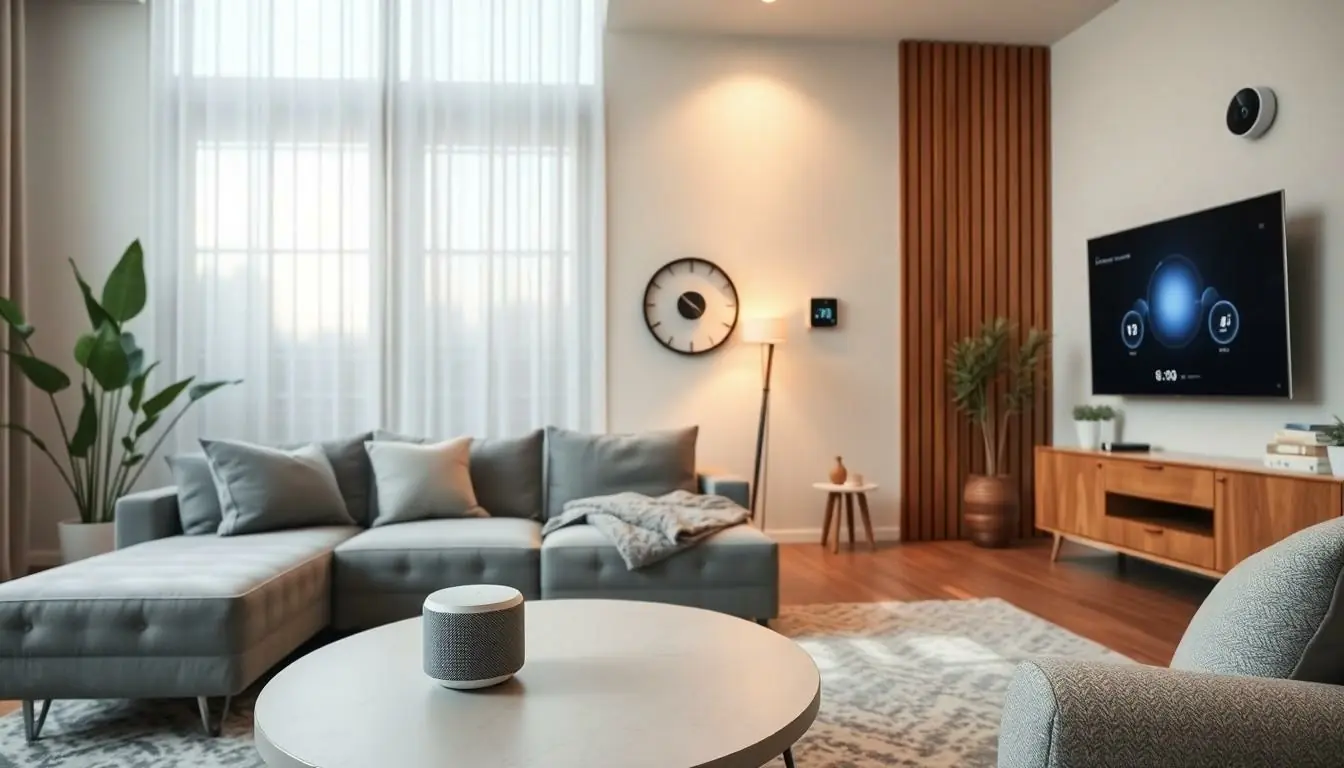Imagine stepping into a home that knows you better than your best friend. With AI smart home technology, that dream’s becoming a reality. These intelligent systems don’t just make life easier; they add a sprinkle of magic to everyday tasks. Want your coffee brewed before you even roll out of bed? Done. Need the lights dimmed for movie night without lifting a finger? Easy peasy.
In a world where even your toaster might have a personality, embracing AI smart home tech isn’t just about convenience; it’s about transforming your living space into a responsive haven. Say goodbye to the days of fumbling with remotes and hello to a home that anticipates your needs. Get ready to unlock a lifestyle that’s not just smart but downright brilliant.
Table of Contents
ToggleOverview of AI Smart Home Technology
AI smart home technology revolutionizes how people interact with their living spaces. These systems mesh seamlessly with modern lifestyles, intuitively addressing daily needs.
Definition and Concept
AI smart home technology refers to automation systems that control various household functions using artificial intelligence. These systems learn user preferences, improving over time to provide tailored experiences. Examples include smart thermostats that adjust temperatures based on habits and voice-activated assistants that manage appliances. Connectivity between devices enhances the overall ecosystem, promoting efficiency and convenience. As homes evolve into interconnected hubs, AI technologies simplify everyday tasks, providing users with more relaxation and engagement in their environments.
Evolution of Smart Homes
Smart homes evolved from basic automation to sophisticated AI systems. Initially, devices focused on single functionalities like remote lighting control. As technology advanced, integration became key, allowing multiple devices to communicate and cooperate. The rise of internet connectivity in the 2000s spurred this evolution, leading to cloud-based solutions and mobile applications. Recent developments include machine learning algorithms and voice recognition, enabling more interactive and responsive home environments. The journey from simple automation to AI smart homes marks a significant leap in how people experience comfort and convenience at home.
Key Features of AI Smart Homes

AI smart homes offer transformative features that significantly enhance everyday living experiences. These systems streamline various household tasks, all while learning user preferences to improve over time.
Automation and Control
Automation enables seamless management of household devices. Smart thermostats adjust temperatures based on individual habits, promoting energy efficiency. Smart lighting adjusts automatically, reacting to natural light or user schedules. Voice-activated assistants provide hands-free control over multiple devices, allowing users to set moods or manage tasks effortlessly. Integrated systems communicate, creating a synchronized environment tailored to user needs. For instance, when leaving home, one command can secure doors, adjust thermostats, and turn off lights simultaneously. Automation not only simplifies daily routines but enhances comfort and convenience.
Enhanced Security
Enhanced security features are fundamental in AI smart homes. Smart cameras offer real-time monitoring and alerts, ensuring safety from intrusions. Motion sensors activate lights or alarm systems when unwanted movement is detected, providing peace of mind. Remote access enables homeowners to manage security systems from anywhere, whether checking video feeds or locking the front door. Integration with smart notifications allows users to receive instant updates on security status. Additionally, AI algorithms can analyze patterns and detect unusual activities, further protecting households. This proactive approach to security reinforces a sense of safety within the living environment.
Benefits of Implementing an AI Smart Home
AI smart homes offer numerous advantages, enhancing everyday living by integrating advanced technology into daily routines.
Energy Efficiency
Improved energy management becomes a hallmark of AI smart homes. Smart thermostats automatically adjust heating and cooling based on occupancy and preferences, leading to significant savings on energy bills. These systems can optimize energy consumption by utilizing data from weather forecasts and historical usage patterns. LED lighting integrated with AI can adjust brightness according to natural light availability, further reducing electricity use. According to studies, smart home technology can reduce energy consumption by up to 30%. Overall, this efficiency decreases the carbon footprint while maintaining comfort.
Increased Convenience
Increased convenience is another standout feature of AI smart homes. Systems respond to voice commands and allow users to control various devices seamlessly. It’s possible to schedule household tasks, such as vacuuming or watering plants, making daily management effortless. Real-time notifications from smart appliances keep homeowners informed about their home’s status, enhancing control and decision-making. Custom routines can trigger multiple devices simultaneously, creating a harmonious living environment. On average, smart home users report saving about 30 minutes daily with these automated features. Efficiency and ease define the modern smart home experience.
Popular AI Smart Home Devices
AI smart home devices offer practical solutions that improve convenience and efficiency in daily routines.
Smart Speakers
Smart speakers serve as voice-activated hubs for controlling various devices. These tools leverage artificial intelligence to understand and execute commands, making household management seamless. Popular options include Amazon Echo and Google Home. Users can play music, get news updates, and control smart home devices, all through voice interaction. Smart speakers integrate with multiple services and devices, enhancing the user experience by providing a centralized point for voice command control. They improve accessibility, allowing individuals to manage their environment without needing physical input.
Smart Thermostats
Smart thermostats revolutionize home energy management. These devices learn patterns of daily activities and adjust temperatures automatically to optimize comfort and efficiency. Models like Nest and Ecobee demonstrate the benefits of AI integration in managing heating and cooling systems. Users can control settings remotely via smartphone apps, facilitating energy savings. Studies show smart thermostats can reduce energy consumption by up to 30%, leading to lower utility bills. These devices adapt to changes in user preferences and environmental conditions, promoting a sustainable lifestyle while ensuring a comfortable home atmosphere.
Challenges and Considerations
AI smart home technology presents various challenges that users must navigate. Addressing concerns around privacy and ensuring compatibility between devices are key considerations.
Privacy Concerns
Privacy stands as a significant concern in AI smart homes. Household devices collect vast amounts of personal data, creating potential vulnerabilities. Protecting sensitive information requires strong security measures and data encryption. Users must remain vigilant, understanding how their data is used and shared. Reports indicate that nearly 40% of consumers worry about their privacy when using smart home devices. Choosing reputable brands with transparent policies can mitigate risks and enhance trust in the technology.
Compatibility Issues
Compatibility issues often arise as consumers integrate multiple devices into their smart homes. Various manufacturers produce different standards, leading to challenges in seamless operation. Ensuring that devices can work together requires thorough research before purchase. Incompatibility can hinder system performance, leading to user frustration. Studies reveal that 60% of smart home users experience connectivity issues at some point. Investing in products designed to work within the same ecosystem can enhance user experience and facilitate control over smart home systems.
AI smart home technology is reshaping how people interact with their living spaces. By seamlessly integrating automation and intelligence, it enhances comfort and efficiency while addressing user needs. The convenience of managing household tasks through voice commands and smart devices makes everyday life simpler and more enjoyable.
As advancements continue, potential users should remain aware of privacy concerns and compatibility issues. Choosing reputable brands and conducting thorough research can lead to a more satisfying smart home experience. Embracing this technology not only transforms homes into responsive environments but also paves the way for a more sustainable and secure future.



